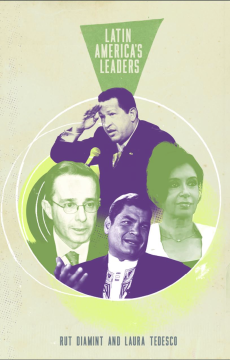
Additional Information
Book Details
Abstract
Cult-of-personality or true democracy? The rise of populism worldwide, combined with the overwhelming success of leaders in Latin America, has positioned the region at the forefront of political debate. Conventional wisdom presents this trend as a handful of charismatic individuals leading an ideological challenge to liberal democracy. But can it really be that simple?
Based on exclusive interviews with over three hundred politicians – former presidents, vice presidents, current party officials and hundreds more – Latin America's Leaders exposes what the Pink Tide really thinks of its presidents. Arguing that the political styles of leaders such as Hugo Chávez, Rafael Correa, Álvaro Uribe and Cristina Fernández de Kirchner are far better explained in the context of their respective countries' party systems, the authors examine political stability through the paradoxical relationship between democracy and the concentration of power in charismatic individuals.
This is the definitive guide to the world's most left-wing continent.
‘In this extraordinary book, based on over three hundred interviews conducted with politicians in five countries, Diamint and Tedesco show how leaders are constrained by party systems and how their normative preferences shape the quality of democracy.’
Aníbal Pérez-Liñán, University of Pittsburgh
‘An empirically rich and conceptually sophisticated book on political leadership in Latin America. This illuminating study fills a significant gap in the literature.’
Michael Shifter, president of Inter-American Dialogue
‘Casts a keen eye on the role of political leaders in South America's diverse democracies by analyzing their words and actions up close and in depth.’
Ted Piccone, author of Five Rising Democracies and the Fate of the International Liberal Order
‘An original and fascinating approach to the issue of the quality of democracy. This thought-provoking analysis should be essential reading.’
Peter Lambert, University of Bath
Rut Diamint is professor of international relations at Universidad Torcuato di Tella, researcher at the National Council for Scientific and Technological Research (CONICET) and a member of the Advisory Committee of Club de Madrid and the UN Secretary General Advisory Board on Disarmament Matters.
Laura Tedesco is associate professor of political science at Saint Louis University, Madrid Campus, and at Instituto de Empresa, Madrid. She has been a consultant for UNICEF and worked as an analyst for FRIDE, Spain.
Table of Contents
| Section Title | Page | Action | Price |
|---|---|---|---|
| Front Cover | Front cover | ||
| About the Authors | ii | ||
| Title Page | iii | ||
| Copyright | iv | ||
| Dedication | v | ||
| Contents | vii | ||
| List of Figures and Tables | ix | ||
| Acknowledgements | x | ||
| Introduction | 1 | ||
| Chapter 1: How to study leaders | 10 | ||
| Chapter 2: Models of democratic leadership | 43 | ||
| Chapter 3: Leadership in the context of a stable party system: Uruguay and Colombia | 64 | ||
| Chapter 4: Leadership in the context of a crisis: Argentina and Ecuador | 97 | ||
| Chapter 5: Leadership in the context of the collapse of a party system: Venezuela | 127 | ||
| Chapter 6: Rethinking political leadership | 150 | ||
| List of Interviews | 155 | ||
| Notes | 170 | ||
| Bibliography | 172 | ||
| Index | 184 |
